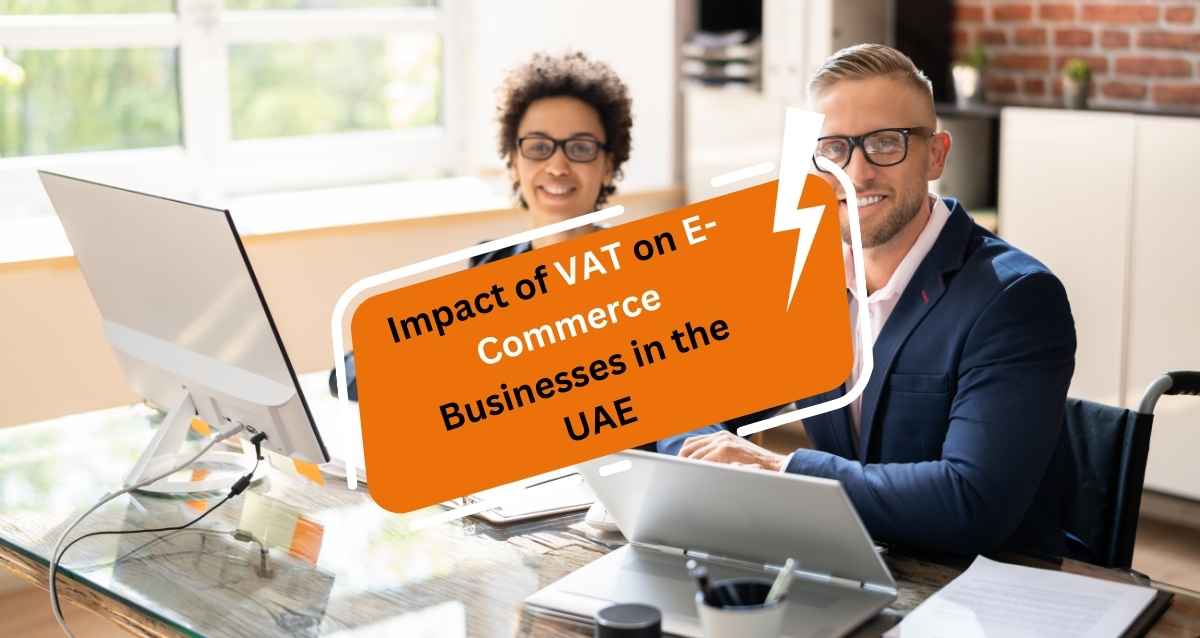Impact of VAT on E-Commerce Businesses in the UAE
In this fast-paced world, e-commerce has made its place in everyone's heart. E-commerce is the buying and selling of goods and services through an online platform. People instead of going out shopping, shop anytime from anywhere and the products or services are delivered to them at their place. Examples are shopping apps like Noon, and Amazon, food delivery apps or getting saloon services at your doorstep. E-commerce has made shopping faster and easier for the shoppers as well as for the vendors. It is the responsibility of the e-commerce businesses to comply with the VAT regulations from the Federal Tax Authority (FTA).
1. Understanding VAT in E-Commerce
Just like the physical stores, VAT applies to e-commerce products and services too. On the one hand, customers pay VAT when buying online on the other hand seller sends the collected VAT to the government.
VAT Rates for E-commerce:
* Standard Rated Supplies (5%): This applies to the sale of most goods and services within the UAE.
* Zero-Rated Supplies: Export of goods and services may qualify for zero-rated VAT. Also, certain local supplies are eligible for zero-rated (Example:- Preventive medicals)
* Exempt supplies: Financial services, Local passenger transport and certain real estate transactions are VAT-exempt.
2. VAT Registration for E-Commerce Businesses
Selling of goods or services online by e-commerce businesses must be registered for VAT. If the business revenue exceeds AED 375,000, it is mandatory to register for VAT on the other side businesses may voluntarily register for VAT if the revenue exceeds AED 187,500.
How to Register for VAT:
1) Create an account on the FTA portal.
2) Provide documents such as trade license, financial records and business details.
3) Submit VAT application and obtain Tax Registration Number (TRN).
4) Once registered, you must charge VAT on sales and file VAT returns regularly.
3. What are the Compliance Challenges for E-commerce Businesses?

A. Determining the place of supply
* VAT implication is determined by the place of supply.
* 5% VAT is applicable on the sales within the UAE whereas exports may be zero-rated.
B. Handling Cross-border Transactions
* Businesses selling to customers abroad must need to verify if their transactions are qualified for VAT exemption.
* Proper records and management are required for VAT on the import of goods bought from overseas suppliers.
C. VAT applicable on Digital Services
* Businesses may need to follow VAT rules when selling digital products like e-books, online courses or streaming services, depending on the place of supply which is a place of use or enjoyment.
* VAT must be applied if the customer is based in the UAE.
D. Tax Invoicing and Documentation
* Tax invoices should display the TRN, VAT amount charged and details of goods or services provided.
* Maintaining accurate and organized records is essential for VAT audits.
E. Returns and Refunds
* If a product is returned or any discount is given, adjust the VAT amount accordingly.
* Credit notes should be issued to reflect refunds and ensure VAT reporting accurately.
4. VAT Filing and Payment Obligations
E-commerce businesses are required to file VAT returns every quarterly or as specified by the Federal Tax Authority (FTA). Late submissions or inaccurate VAT calculations can lead to hefty penalties.

VAT Filing: Helpful Tips
* Maintain accurate and detailed sales and expense records.
* Automate VAT calculations and reduce errors by using Accounting software.
* Verify VAT input and output before filing returns.
* Always ensure the filing deadlines to avoid penalties.
5. Enhancing VAT Compliance for E-commerce Growth
Streamlining VAT compliance for e-commerce businesses helps them in many ways like building customer trust, avoiding penalties and supporting long-term growth. Choosing the appropriate tools, seeking expert guidance and training your team, will ensure smooth VAT compliance so that you can focus on scaling your business.
A. Leverage Technology for Compliance
* Invest in accounting software that complies with VAT.
* To simplify reporting and reduce errors, use automated tools for tax calculations.
B. Seek Expert Tax Advisory
* Ensure your business operates in tax efficient manner by collaborating with VAT specialists.
* You should always remain informed of the updates from the Federal Tax Authority (FTA) to adapt to any changes in VAT regulations.
C. Train your team on VAT Compliance
* Training on VAT rules and invoicing requirements must be given to employees.
* Ensure customer service teams understand VTA-related customer inquiries.
Conclusion
In conclusion, it is very important to have complied with VAT regulations for running an e-commerce business. Sellers need to clearly understand the VAT rules to charge the right amount from the customers and hence stay compliant with VAT tax laws. Businesses require careful attention in handling cross-border transactions for VAT to the place of supply and proper documentation. This can help them avoid penalties and ensure smooth operations. Using appropriate tools, expert guidance and a well-trained team, e-commerce businesses can successfully navigate the VAT landscape.
Why Choose Flying Colour Tax Consultant LLC?
At Flying Colour Tax Consultant LLC, we specialize in supporting e-commerce businesses with all their VAT requirements. Our services include:
- Ensures you meet all legal requirements by assisting with VAT registration and compliance.
- Accurate and timely VAT returns filing to avoid penalties.
- Navigating cross-border VAT challenges.
- Providing expert tax advisory services to enhance your business operations.
Here is the tip: Stay compliant, reduce risks and focus on your e-commerce business growth with confidence.
To learn more about Impact of VAT on E-Commerce Businesses in the UAE: Compliance and Challenges, book a free consultation with one of the Flyingcolour team advisors.
Disclaimer: The information provided in this blog is based on our understanding of current tax laws and regulations. It is intended for general informational purposes only and does not constitute professional tax advice, consultation, or representation. The author and publisher are not responsible for any errors or omissions, or for any actions taken based on the information contained in this blog.

